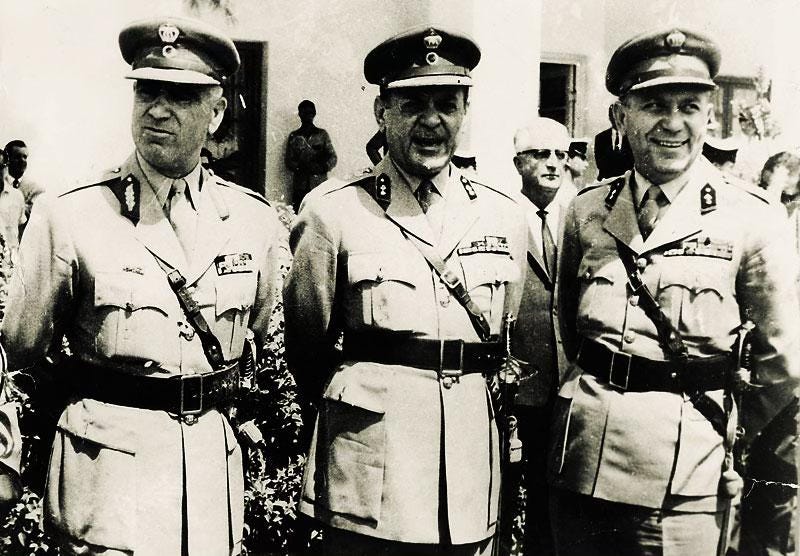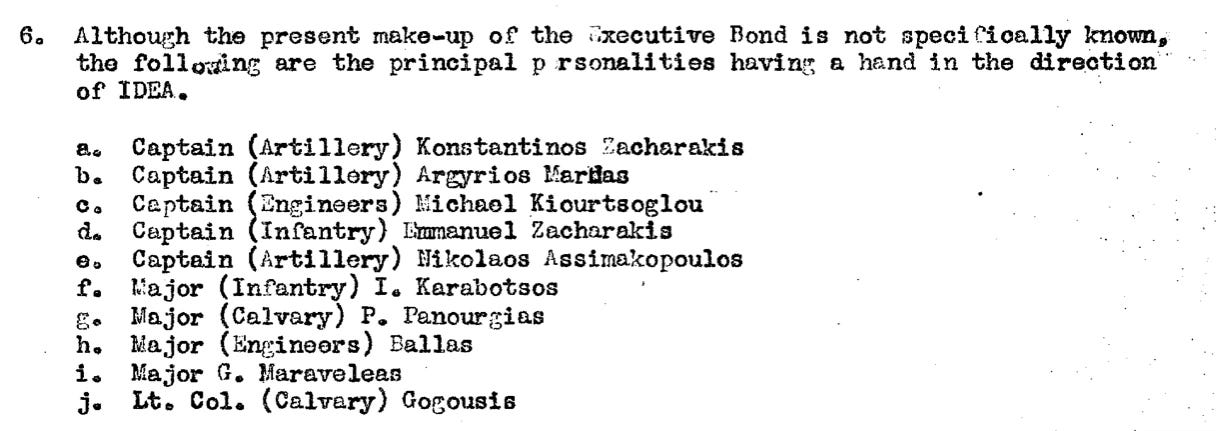A secret service connection? Argyris Mardas, IDEA and KYP
Employment by Greece’s Central Intelligence Service could explain why Alexis Mardas’ father is often associated with military and secret activity

“His dad was something to do with the military in Greece, and Alex knew all the military there, very strange.”
That’s how George Harrison described Alexis Mardas1. And it’s far from the only reference to Alexis’ father – whose first name we know was Argyris – having military or state connections. Several accounts also suggest there was an element of secrecy to his work. In 1979, the journalist Duncan Campbell wrote that Alexis’ father was “a major in the Greek secret police”.2
Given that Alexis Mardas was a central figure in organising the Beatles’ trip to Greece in 1967, and supporting their plans to buy a Greek island, it would make sense to look at these claims more closely. It’s previously been credibly suggested to me that Alexis’ father worked for KYP – Greece’s Central Intelligence Service. If true, this might explain both the military and ‘secret’ themes which consistently crop up in relation to him.
That possibility seems to line up with all the known facts. And as I was researching the history of KYP in more detail, I discovered something that makes the suggestion that Argyris Mardas worked for the organisation more compelling. An officer with the same name was a key member of a secret right-wing group in the Greek army – which shared many members with KYP and was an influential political forerunner of the colonels’ military dictatorship.
Military origins
The roots of both KYP and Greece’s 1967 junta go back to the second world war, and the country’s bitter civil war that was fought in the following years. During Greece’s occupation by Axis forces, communist-led guerrilla groups carried out the lion’s share of resistance activities – initially supported by the British and the Americans despite ideological differences. But as the country’s liberation looked increasingly likely and the post-war situation came into view, tensions grew between communist-dominated and non-communist groups, and soon broke out into violence.
The possibility of communists gaining political influence loomed large in post-war Greek politics – particularly given Greece’s strategic importance for NATO. Following the end of the civil war in 1949, containing the threat of communism became a preoccupation of successive Greek governments, with considerable backing from the US.
This was also the central purpose of KYP. After it was founded in 1953, the organisation’s role was to “face the internal threat of Greek communism and its ramifications outside Greece”, according to Pavlos Apostolidis, a former director of KYP’s successor agency, EYP. The organisation was “staffed mainly by army officers in the key positions”, says Apostolidis. And after the colonels’ military dictatorship took power in 1967, he writes that it became “the bulwark of the regime and the enemy of its opponents, at home and abroad”.3
Two of the junta’s leaders – George Papadopoulos and Nicholas Makarezos – “had in the past held key positions” in KYP, Apostolidis tells us. And the historian Eleni Braat writes that “the KYP and the colonels maintained close ties”, with the head of the KYP during the junta being “a close friend of Papadopoulos”. In fact, “persisting associations” with the dictatorship have prompted ongoing suspicion towards KYP in more recent decades, and repeated calls for its demilitarisation (it officially became a civilian service in 1986, when it was renamed EYP (National Intelligence Service).4

IDEA – a secret group of right-wing army officers
Going further back, both KYP and the colonels’ dictatorship also have strong connections to a secret group of right-wing army officers that was formed in October 1944, just after the end of Greece’s occupation. During and after the second world war, political tensions led to a proliferation of secret military associations, supporting the interests of different factions. The most influential of these societies was IDEA – whose initials stand in Greek for ‘Holy Bond of Greek Officers’. The group was formed following a series of leftist mutinies in the Greek armed forces in the Middle East during the war, and its overriding aim was to see off the threat of communism.
IDEA is described by two respected historians of Greece as “ultra right-wing”5. A CIA report from 1948 concluded that the group “will support or even bring about a dictatorial form of government” should Greece’s political situation “reach an impasse” – and indeed, it unsuccessfully attempted to effect a military coup in 1951. By this point, IDEA was believed to have up to 2,000 officers in key positions. A different CIA report, from 1956, described the group as an “off-stage influence of great importance in Greek political life”, focused on “making the armed forces a bulwark of conservative strength”.
In terms of both people and principles, there were strong connections between IDEA and KYP. The 1956 CIA briefing says IDEA controlled “many of the top posts” both in the country’s military hierarchy and the intelligence service. And Apostolides writes that “many” KYP employees belonged to IDEA, pointing out that the first KYP director – Colonel and later General Alexandros Natsinas – was also “a key member” of the secret right-wing group. So the shared heritage, personnel and political outlook between IDEA, KYP, and the colonels’ dictatorship is clear.

Argyrios Mardas and IDEA
The plausible outline of Alexis Mardas’ father that has so far emerged – right-wing politics, a military background and involvement in secret activity – aligns with the suggestion that he worked for KYP. Given this, it’s striking that one of the key original members of IDEA had the same name as he did.
During Greece’s occupation, an array of resistance and paramilitary organisations were formed with varying political stances – including a nationalist group called Triaina (Trident). One of the members of Triaina’s steering committee was named Mardas – and his first name is given as Argyrios, the more formal version of the name Argyris. When IDEA was created at the end of the occupation, its leadership contained several former members of Triaina – including the same Argyrios Mardas.
Magda Fytili, who led a recent University of Athens research project on Greek resistance organisations, tells me that IDEA was formed from Triaina and a monarchist group called ENA (Young Officers' Union). Both organisations “considered it necessary to rally nationalist officers, to effectively counter the danger of communism”, she explains.
A CIA report from 1947 lists the original administrative committee of IDEA – including Argyrios Mardas, named as an artillery captain with responsibility for “directing the section dealing with political contacts and acquisition of informants”. A separate CIA briefing the following year names captain Argyrios Mardas among the “principal personalities having a hand in the direction of IDEA”.

Was this Argyrios Mardas the same person as Alexis’ father, Argyris Mardas? The slight difference in the spelling of the name shouldn’t deter us from drawing this conclusion. In Greece, Argyris (Αργύρης) and Argyrios (Αργύριος) are in effect the same name. ‘Argyrios’ is the official form, while ‘Argyris’ is the more informal version used on an everyday basis. And it’s not unusual for a person with this name to use both versions in different situations.
So can we be more specific about what Alexis Mardas’ father did that was believed to be “something to do with the military”? The nature of secret organisations makes it difficult to be certain. But in my view, the known role of Argyrios Mardas within IDEA certainly adds more weight to the claim that Argyris Mardas worked for KYP.
Read more:
Lord Goodman: Lawyer to the Beatles - and the prime minister
The intriguing inner circle of Alexis Mardas
Where was the Greek island the Beatles wanted? The evidence
The Beatles Anthology book (Cassell & Co, 2000)
New Statesman, 3 August 1979
Pavlos Apostolidis (2007) Intelligence services in the National Security System: the case of EYP. Hellenic Foundation for European and Foreign Policy
Eleni Braat (2023) Democratization of Intelligence: Demilitarizing the Greek Intelligence Service after the Junta. International Journal of Intelligence and CounterIntelligence
Richard Clogg and André Gerolymatos



Excellent research as always. My question is always, what's the motivation? What's in it for the Greek government to have the Beatles on an island there? Surely it can't just be a desire to send a signal that Greece, even under a repressive government, is a good place for artists? Repressive governments generally don't want artists. Artists are trouble. Especially the Beatles.
Keep digging! I'm all in.